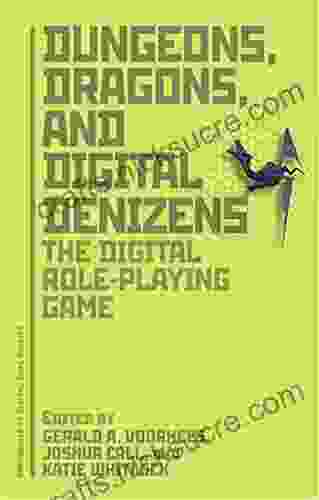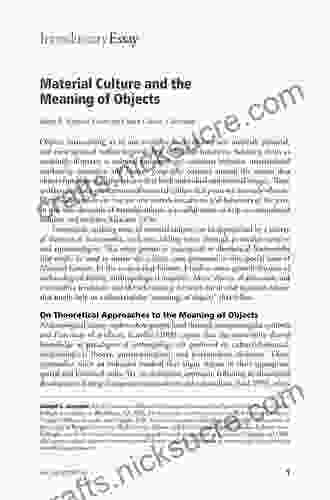The Not So Intelligent Designer: A Comprehensive Examination of William Dembski's Theory of Intelligent Design

Intelligent design (ID) is a controversial theory that proposes that certain features of the universe and living organisms are best explained by an intelligent cause, rather than by natural selection alone. Proponents of ID argue that the complexity and apparent design of the natural world cannot be fully accounted for by random processes, and that an intelligent designer is therefore the most reasonable explanation.
4.3 out of 5
| Language | : | English |
| File size | : | 36484 KB |
| Text-to-Speech | : | Enabled |
| Screen Reader | : | Supported |
| Enhanced typesetting | : | Enabled |
| Word Wise | : | Enabled |
| Print length | : | 246 pages |
| Lending | : | Enabled |
William Dembski is one of the leading proponents of ID. In his book The Design Inference, Dembski argues that ID is a legitimate scientific theory that provides a better explanation for the origin of life than does natural selection. However, critics of ID argue that it is not a true science, but rather a religious belief that has no place in the classroom.
In this article, we will examine Dembski's theory of ID in detail. We will discuss the arguments for and against ID, and we will assess its scientific validity.
Dembski's Theory of Intelligent Design
Dembski's theory of ID is based on the idea that there are certain features of the universe that are "irreducibly complex." Irreducible complexity refers to systems that are composed of multiple parts, each of which is essential for the function of the system as a whole. Dembski argues that irreducible complexity cannot be produced by natural selection, because natural selection can only act on individual parts of a system, not on the system as a whole.
Dembski gives the example of a mousetrap. A mousetrap is composed of several parts, including a base, a spring, a trigger, and a bar. Each of these parts is essential for the function of the mousetrap as a whole. If any one of these parts is missing, the mousetrap will not work.
Dembski argues that the mousetrap is an example of irreducible complexity. He says that natural selection could not have produced the mousetrap because natural selection could not have simultaneously acted on all of the parts of the mousetrap in a way that would have produced a functional system.
Dembski argues that the mousetrap is not the only example of irreducible complexity in nature. He says that there are many other biological systems that are irreducibly complex, including the human eye, the human immune system, and the bacterial flagellum.
Arguments for Intelligent Design
Proponents of ID argue that the theory is supported by several lines of evidence. These include:
- The argument from irreducible complexity. As we discussed above, Dembski argues that irreducible complexity cannot be produced by natural selection. He says that this is evidence for an intelligent designer.
- The argument from specified complexity. Proponents of ID also argue that the universe is specified complex. Specified complexity refers to systems that have a high degree of order and organization. Proponents of ID say that specified complexity is evidence for an intelligent designer because it is unlikely that such order and organization could have arisen by chance.
- The argument from fine-tuning. Proponents of ID also argue that the universe is fine-tuned for life. Fine-tuning refers to the fact that the universe has a number of physical constants that are precisely tuned to allow for the existence of life. Proponents of ID say that fine-tuning is evidence for an intelligent designer because it is unlikely that such precise tuning could have occurred by chance.
Arguments against Intelligent Design
Critics of ID argue that the theory is not supported by the evidence. These arguments include:
- The argument from lack of testability. Critics of ID argue that the theory is not testable. They say that there is no way to design an experiment that could prove or disprove ID.
- The argument from lack of explanatory power. Critics of ID also argue that the theory does not provide a good explanation for the origin of life. They say that ID simply pushes the question of how life arose back one step. Instead of explaining how life arose from non-living matter, ID simply says that life was created by an intelligent designer.
- The argument from religious bias. Critics of ID also argue that the theory is based on religious bias. They say that the proponents of ID are simply trying to use science to support their religious beliefs.
The debate over intelligent design is likely to continue for many years to come. There is no easy answer to the question of whether or not ID is a valid scientific theory. However, it is important to be aware of the arguments for and against ID, and to be able to critically evaluate the evidence.
4.3 out of 5
| Language | : | English |
| File size | : | 36484 KB |
| Text-to-Speech | : | Enabled |
| Screen Reader | : | Supported |
| Enhanced typesetting | : | Enabled |
| Word Wise | : | Enabled |
| Print length | : | 246 pages |
| Lending | : | Enabled |
Do you want to contribute by writing guest posts on this blog?
Please contact us and send us a resume of previous articles that you have written.
 Fiction
Fiction Non Fiction
Non Fiction Romance
Romance Mystery
Mystery Thriller
Thriller SciFi
SciFi Fantasy
Fantasy Horror
Horror Biography
Biography Selfhelp
Selfhelp Business
Business History
History Classics
Classics Poetry
Poetry Childrens
Childrens Young Adult
Young Adult Educational
Educational Cooking
Cooking Travel
Travel Lifestyle
Lifestyle Spirituality
Spirituality Health
Health Fitness
Fitness Technology
Technology Science
Science Arts
Arts Crafts
Crafts DIY
DIY Gardening
Gardening Petcare
Petcare Emily Suzanne Clark
Emily Suzanne Clark Abigail Hing Wen
Abigail Hing Wen Jennifer Greene
Jennifer Greene Iain Highfield
Iain Highfield Randy Walker
Randy Walker Christopher Pike
Christopher Pike Helen C Rountree
Helen C Rountree Stephen A Mitchell
Stephen A Mitchell Steve Mcmenamin
Steve Mcmenamin Terry Palechuk
Terry Palechuk Neil Oliver
Neil Oliver Aaron Reed
Aaron Reed P S Page
P S Page Gary Sakuma
Gary Sakuma Achusim Michael
Achusim Michael Abridged Ed Edition Kindle Edition
Abridged Ed Edition Kindle Edition Cassandra Eason
Cassandra Eason Gisle Solhaug
Gisle Solhaug Maxine Levaren
Maxine Levaren Lindsey Ellison
Lindsey Ellison Stefan Ball
Stefan Ball Rachel Caine
Rachel Caine Lynn Alley
Lynn Alley Laura Peyton Roberts
Laura Peyton Roberts Richard Lighthouse
Richard Lighthouse Vikas Kakwani
Vikas Kakwani Shari Eskenas
Shari Eskenas T L Christianson
T L Christianson Robert Reid
Robert Reid Aaron Mahnke
Aaron Mahnke Christian Beamish
Christian Beamish Laurence Steinberg
Laurence Steinberg Rachael Ray
Rachael Ray Man Kam Lo
Man Kam Lo Charles Fernyhough
Charles Fernyhough Ann Mariah Cook
Ann Mariah Cook Alifya And Umesh Mohite
Alifya And Umesh Mohite Paul Chiasson
Paul Chiasson Amby Burfoot
Amby Burfoot Alvin Alexander
Alvin Alexander Michel Roy
Michel Roy Susan Zeppieri
Susan Zeppieri Edward J Larson
Edward J Larson Jimmy Houston
Jimmy Houston Moon Ho Jung
Moon Ho Jung Kel Carpenter
Kel Carpenter Arthur Turrell
Arthur Turrell Miranda Kenneally
Miranda Kenneally Betsy Miller
Betsy Miller Adam Benshea
Adam Benshea Kirk Bailey
Kirk Bailey Baba Ifa Karade
Baba Ifa Karade Steve Griffith
Steve Griffith Kevin A Morrison
Kevin A Morrison Curt Lader
Curt Lader Farah Shabazz Ii
Farah Shabazz Ii Adam Becker
Adam Becker Gloria Atanmo
Gloria Atanmo Adam H Balen
Adam H Balen Lenyfer Garrido
Lenyfer Garrido Kathy Koch Phd
Kathy Koch Phd Chella Quint
Chella Quint Miriam Forman Brunell
Miriam Forman Brunell Aaron Reed Msn Crna
Aaron Reed Msn Crna Kim Gosselin
Kim Gosselin Abby Mcallister
Abby Mcallister Shannon Hale
Shannon Hale George J Hademenos
George J Hademenos Sarah Moore
Sarah Moore Meg Keys
Meg Keys O Thomas Gift
O Thomas Gift Abigail Melton
Abigail Melton Linda Sarris
Linda Sarris Catherine Ryan Hyde
Catherine Ryan Hyde Judi Kesselman Turkel
Judi Kesselman Turkel Michelle Hodkin
Michelle Hodkin Randall Hyde
Randall Hyde Gail Buckland
Gail Buckland Craig Timberg
Craig Timberg Sam Jarman
Sam Jarman Jenny Han
Jenny Han Adam Lashinsky
Adam Lashinsky Lisa Robertson
Lisa Robertson Papus
Papus Gayle Forman
Gayle Forman Winifred Conkling
Winifred Conkling Ann Frederick
Ann Frederick Barry Robinson
Barry Robinson John Hancock
John Hancock Zoyla Arana
Zoyla Arana Eduardo Duran
Eduardo Duran Douglas W Hubbard
Douglas W Hubbard Jennifer Finney Boylan
Jennifer Finney Boylan Lynn E Ponton
Lynn E Ponton Wayne Westcott
Wayne Westcott Horace Kephart
Horace Kephart Axie Oh
Axie Oh Abdelkader Nouiri
Abdelkader Nouiri Cornel West
Cornel West Sean Mcmanus
Sean Mcmanus Teresa Finney
Teresa Finney Ada Calhoun
Ada Calhoun Sam J Miller
Sam J Miller Marvin Valerie Georgia
Marvin Valerie Georgia Lisa Latimer
Lisa Latimer Al Yellon
Al Yellon Caroline Kaufman
Caroline Kaufman Conrad Bauer
Conrad Bauer Aliza Green
Aliza Green Deborah Beck Busis
Deborah Beck Busis Aiden Thomas
Aiden Thomas Adam Galinsky
Adam Galinsky John Kean
John Kean Abbey Curran
Abbey Curran Katie Lear
Katie Lear Jeremy Paxman
Jeremy Paxman Rick Sekuloski
Rick Sekuloski Phil Boyle
Phil Boyle Lisa Heffernan
Lisa Heffernan Tamora Pierce
Tamora Pierce Peter David
Peter David Tom Jackson
Tom Jackson Sasha Abramsky
Sasha Abramsky Elena Aguilar
Elena Aguilar Devika Primic
Devika Primic Rob Gray
Rob Gray Christopher S Stewart
Christopher S Stewart Tali Edut
Tali Edut Abby Sunderland
Abby Sunderland Sarah Maslin Nir
Sarah Maslin Nir Gladys Chepkirui Ngetich
Gladys Chepkirui Ngetich Jay Dawes
Jay Dawes Marc Dando
Marc Dando Vince Kotchian
Vince Kotchian Laura Sebastian
Laura Sebastian Amelia Whitmore
Amelia Whitmore Dr Robert Pasahow
Dr Robert Pasahow Ian Mcleod
Ian Mcleod Leigh Bardugo
Leigh Bardugo Corinne Andrews
Corinne Andrews Andrew Campanella
Andrew Campanella Asato Asato
Asato Asato Matt Warshaw
Matt Warshaw Sheldon Axler
Sheldon Axler David Warriner
David Warriner David Lipsky
David Lipsky Lisa M Given
Lisa M Given Rory Miller
Rory Miller Charles Thomas Jr
Charles Thomas Jr Tomi Adeyemi
Tomi Adeyemi Brigitte Jordan
Brigitte Jordan Barbara Decker
Barbara Decker Michael Johnson
Michael Johnson Jeremy Miles
Jeremy Miles Adam Braus
Adam Braus Hillary Allen
Hillary Allen Aaron Blight
Aaron Blight Adam Kimelman
Adam Kimelman Phil Gaimon
Phil Gaimon Achille Rubini
Achille Rubini Stephen R Lawhead
Stephen R Lawhead Eugene H Merrill
Eugene H Merrill Dan Shideler
Dan Shideler Robert Allans
Robert Allans Fumio Sasaki
Fumio Sasaki William Hamilton Gibson
William Hamilton Gibson Blake D Bauer
Blake D Bauer Carmen Moreno
Carmen Moreno Michelle Obama
Michelle Obama Lisa M Schab
Lisa M Schab David Feddes
David Feddes Christina Hoff Sommers
Christina Hoff Sommers Adam Koch
Adam Koch John Caig
John Caig Todd Graves
Todd Graves Claire Ahn
Claire Ahn Abinash Das
Abinash Das Barbara Fox
Barbara Fox Deborah Madison
Deborah Madison Brian Greene
Brian Greene Tomos Forrest
Tomos Forrest Rex Ogle
Rex Ogle Gregor Clark
Gregor Clark R L Stine
R L Stine James Heberd
James Heberd Matt Owens
Matt Owens Helen Scales
Helen Scales Jessica Hepburn
Jessica Hepburn Irakli Makharadze
Irakli Makharadze Kemi Iwalesin
Kemi Iwalesin David Rensin
David Rensin Steven Alan Childress
Steven Alan Childress Adam Enaz
Adam Enaz Jennifer Ackerman
Jennifer Ackerman Tom Rosenbauer
Tom Rosenbauer Jim Willis
Jim Willis Natasha Preston
Natasha Preston John Taylor
John Taylor Dick Edie
Dick Edie Louise Thaden
Louise Thaden Megan Lane
Megan Lane Christopher Black
Christopher Black Ronald Kaine
Ronald Kaine John D Gordon
John D Gordon Barry Dainton
Barry Dainton Stephanie Zeiss
Stephanie Zeiss Sissy Goff
Sissy Goff Vivian Gussin Paley
Vivian Gussin Paley Kristin Berry
Kristin Berry Walter Browder
Walter Browder Scott Meyers
Scott Meyers Uri Bram
Uri Bram Abigail Pogrebin
Abigail Pogrebin Richard Sattora
Richard Sattora Kate Rope
Kate Rope Marlene Wagman Geller
Marlene Wagman Geller Lin Wellford
Lin Wellford Katrina Kahler
Katrina Kahler Elisabetta Viggiani
Elisabetta Viggiani Virginia Smith Harvey
Virginia Smith Harvey Lisa Pineda
Lisa Pineda Pamela Druckerman
Pamela Druckerman Susan Walton
Susan Walton Phong Thong Dang
Phong Thong Dang Jack Cavanaugh
Jack Cavanaugh Lynn Rush
Lynn Rush Adam Frank
Adam Frank Charles L Byrne
Charles L Byrne Kayla Cottingham
Kayla Cottingham Liza Angela
Liza Angela Randi Hutter Epstein
Randi Hutter Epstein Thomas Wilson
Thomas Wilson Nick Holt
Nick Holt Jacob Neumann
Jacob Neumann Chashiree M
Chashiree M Rania Abouzeid
Rania Abouzeid Harley Rustad
Harley Rustad E P Marcellin
E P Marcellin Al Desetta
Al Desetta Zoe Hamlet Silva
Zoe Hamlet Silva Jason Korol
Jason Korol Stephanie Puglisi
Stephanie Puglisi Aaron Mccargo
Aaron Mccargo Abbi Glines
Abbi Glines Bobby Reyes
Bobby Reyes Lillian Cumic
Lillian Cumic Gerald A Voorhees
Gerald A Voorhees David G Brown
David G Brown Daphne Poltz
Daphne Poltz Michael Crawley
Michael Crawley Garo Yepremian
Garo Yepremian Emma Crewe
Emma Crewe Joe Simpson
Joe Simpson Tim Jarvis
Tim Jarvis Sharon Boyd
Sharon Boyd Pearson Education
Pearson Education Jessie Hartland
Jessie Hartland Louise Pickford
Louise Pickford Jack Moore
Jack Moore Alicia C Simpson
Alicia C Simpson Beth Newell
Beth Newell Al Barkow
Al Barkow Richelle Mead
Richelle Mead Darrin Bergman
Darrin Bergman Genius Reads
Genius Reads Anthony Wilkenson
Anthony Wilkenson Claire Santry
Claire Santry Brian L Gorman
Brian L Gorman Jon Butterworth
Jon Butterworth Cosmas Inyang
Cosmas Inyang Eze Ugbor
Eze Ugbor Glen Finland
Glen Finland Jasna Tuta
Jasna Tuta Stephen Gray
Stephen Gray Melodie M Davis
Melodie M Davis Justin Driver
Justin Driver Aaron Hahn
Aaron Hahn Abbas Kazerooni
Abbas Kazerooni Sarah K L Wilson
Sarah K L Wilson Paul Schneider
Paul Schneider Michael Gruenbaum
Michael Gruenbaum Emily J Taylor
Emily J Taylor Bill Mckibben
Bill Mckibben Ron Hotchkiss
Ron Hotchkiss Fred Fields
Fred Fields Ed Engle
Ed Engle Ron Jones
Ron Jones Ben Cohen
Ben Cohen Ian Davis
Ian Davis Dan Werb
Dan Werb Adam Boduch
Adam Boduch Carolyn Jessop
Carolyn Jessop Christopher Monahan
Christopher Monahan Heather Lynn
Heather Lynn Andrew Skurka
Andrew Skurka Mark Strom
Mark Strom Monica Sorrenson
Monica Sorrenson Benjamin Roberts
Benjamin Roberts Alicia Silverstone
Alicia Silverstone Achref Hassini
Achref Hassini Aaron James
Aaron James Stacy Eaton
Stacy Eaton Thubten Yeshe
Thubten Yeshe Debbie Elicksen
Debbie Elicksen Renda Dionne Madrigal
Renda Dionne Madrigal Adam Freeman
Adam Freeman Richard Martin
Richard Martin Abigail Owen
Abigail Owen Abby Haight
Abby Haight Marie Cirano
Marie Cirano Chaz Scoggins
Chaz Scoggins Charles H Kraft
Charles H Kraft Aaron J Perry
Aaron J Perry Joy Neighbors
Joy Neighbors Dawson Church
Dawson Church Jeff Bauman
Jeff Bauman Seth Kugel
Seth Kugel Irene Lewis Mccormick
Irene Lewis Mccormick Abraham Silberschatz
Abraham Silberschatz David Simon
David Simon Norton Juster
Norton Juster Sarah Luddington
Sarah Luddington Mary Wong
Mary Wong Larry Carpenter
Larry Carpenter Adam Lazarus
Adam Lazarus Laurie Chaikind Mcnulty Lcsw C
Laurie Chaikind Mcnulty Lcsw C Stephen Brennan
Stephen Brennan Ryan Smithson
Ryan Smithson Vivienne Sanders
Vivienne Sanders Adam Chandler
Adam Chandler Barbara Natterson Horowitz
Barbara Natterson Horowitz Chris Jericho
Chris Jericho Allan Sand
Allan Sand Collins Kids
Collins Kids Emily K Neuburger
Emily K Neuburger Andrea M Nelson Royes
Andrea M Nelson Royes Tom Migdalski
Tom Migdalski Stephen Abbott
Stephen Abbott Abby Hafer
Abby Hafer Chris Worfolk
Chris Worfolk Gerry Donohue
Gerry Donohue Timothy Phelps
Timothy Phelps Erika Fatland
Erika Fatland Stuart Firestein
Stuart Firestein Sophie Mccartney
Sophie Mccartney Achim K Krull
Achim K Krull Felice Fox
Felice Fox Abigail Marshall
Abigail Marshall Ilsa J Bick
Ilsa J Bick Tom Mccarthy
Tom Mccarthy Xiuhtezcatl Martinez
Xiuhtezcatl Martinez Charles C Patrick
Charles C Patrick Steve Rosenberg
Steve Rosenberg Sheila Lamb
Sheila Lamb Laura Gao
Laura Gao Bill Loguidice
Bill Loguidice Og Mandino
Og Mandino Mark Januszewski
Mark Januszewski Lee Sandlin
Lee Sandlin Carl Jones
Carl Jones Jeremy Roenick
Jeremy Roenick Sally Clarkson
Sally Clarkson Colin Hunter
Colin Hunter Michael N Mitchell
Michael N Mitchell Brandon Neice
Brandon Neice Clara Shaper
Clara Shaper Agustin Fuentes
Agustin Fuentes Garrett Mcnamara
Garrett Mcnamara Abigail Alling
Abigail Alling Rose Ann Hudson
Rose Ann Hudson Jeremy Shinewald
Jeremy Shinewald Adam J Cox
Adam J Cox David Winner
David Winner Brad Brewer
Brad Brewer Rolf Mowatt Larssen
Rolf Mowatt Larssen Steve Roper
Steve Roper Amber Fox
Amber Fox An American Citizen
An American Citizen Winston Chang
Winston Chang Ken Retallic
Ken Retallic Carley Roney
Carley Roney Dmv Test Bank
Dmv Test Bank Michael Egan
Michael Egan Taylan Hoca
Taylan Hoca Sheri Van Dijk
Sheri Van Dijk Al Baird
Al Baird Christophe Jaffrelot
Christophe Jaffrelot Martha Gellhorn
Martha Gellhorn Gil Capps
Gil Capps J Robert King
J Robert King Lucio Russo
Lucio Russo Abhishek V R
Abhishek V R Maya Lang
Maya Lang Rosie Pope
Rosie Pope Amber Domoradzki
Amber Domoradzki Pat Chargot
Pat Chargot Abu Mussab Wajdi Akkari
Abu Mussab Wajdi Akkari Aaron Oster
Aaron Oster Tim Larkin
Tim Larkin Chuck Callaway
Chuck Callaway G Bailey
G Bailey Kaylynn Flanders
Kaylynn Flanders Casey Robson
Casey Robson Charlie Barker
Charlie Barker Alan Robertson
Alan Robertson Jay Ruud
Jay Ruud Scott Butler
Scott Butler Michael L Bloomquist
Michael L Bloomquist Debbie Ford
Debbie Ford Jennifer Shannon
Jennifer Shannon Sorin Dumitrascu
Sorin Dumitrascu Peter Sagal
Peter Sagal Ariana Eagleton
Ariana Eagleton Arthur Atchabahian
Arthur Atchabahian Daniel Carter Beard
Daniel Carter Beard Shuai Huang
Shuai Huang Carl Vernon
Carl Vernon James Surowiecki
James Surowiecki Chiara Giuliani
Chiara Giuliani Mikki Daughtry
Mikki Daughtry Jane Gross
Jane Gross Mary Roach
Mary Roach George John Romanes
George John Romanes Sherri Granato
Sherri Granato Israel Finkelstein
Israel Finkelstein Martha C Nussbaum
Martha C Nussbaum Goodman Publishing
Goodman Publishing Andy Couturier
Andy Couturier Lois G Schwoerer
Lois G Schwoerer M J Parisian
M J Parisian Gavin D J Harper
Gavin D J Harper Lavinia Collins
Lavinia Collins Hans C Ohanian
Hans C Ohanian Barbara A Lewis
Barbara A Lewis Scott Shaw
Scott Shaw Peter Harrison
Peter Harrison Dan Morris
Dan Morris Richard Langer
Richard Langer Sean Lewis
Sean Lewis Suzanne Corkin
Suzanne Corkin Jim Morekis
Jim Morekis Aaron Lee Johnson
Aaron Lee Johnson Lucy Letcher
Lucy Letcher Maureen Duffin Ward
Maureen Duffin Ward Ned Johnson
Ned Johnson Kenn Kaufman
Kenn Kaufman Aaron Graves
Aaron Graves Paula Deen
Paula Deen William Deresiewicz
William Deresiewicz Nancy Mohrbacher
Nancy Mohrbacher Ralph Villiger
Ralph Villiger Tony Soper
Tony Soper Adam D Scott
Adam D Scott Kit Bauman
Kit Bauman Jennifer L Hunt
Jennifer L Hunt Robert Fritz
Robert Fritz Abigail Tucker
Abigail Tucker Abdul Foster
Abdul Foster Scott Parsons
Scott Parsons Bathroom Readers Institute
Bathroom Readers Institute Alexander Nehamas
Alexander Nehamas Erik Scott De Bie
Erik Scott De Bie Drew Harris
Drew Harris Reinette Biggs
Reinette Biggs Paul Mclerran
Paul Mclerran Michael Baigent
Michael Baigent Laura Ray
Laura Ray Andy Dumas
Andy Dumas Christopher Knight
Christopher Knight Domenica Marchetti
Domenica Marchetti Annie Nicholas
Annie Nicholas Linford Stutzman
Linford Stutzman Ken Springer
Ken Springer Scott Carney
Scott Carney Bruce Van Brunt
Bruce Van Brunt Brian Hoggard
Brian Hoggard T L Lowery
T L Lowery Adam J Rosh
Adam J Rosh Programming Languages Academy
Programming Languages Academy Roman Dial
Roman Dial Abigail Hair
Abigail Hair
Light bulbAdvertise smarter! Our strategic ad space ensures maximum exposure. Reserve your spot today!

 Pablo NerudaThe Personal Combat Handbook of the Taiwan National Police: A Comprehensive...
Pablo NerudaThe Personal Combat Handbook of the Taiwan National Police: A Comprehensive...
 Franklin BellThe Teen Guide to Global Action: Inspiring Young People to Make a Positive...
Franklin BellThe Teen Guide to Global Action: Inspiring Young People to Make a Positive... Walt WhitmanFollow ·19.2k
Walt WhitmanFollow ·19.2k Anton FosterFollow ·16.1k
Anton FosterFollow ·16.1k Caleb LongFollow ·10.3k
Caleb LongFollow ·10.3k Francis TurnerFollow ·9.6k
Francis TurnerFollow ·9.6k Stan WardFollow ·17.6k
Stan WardFollow ·17.6k Eric HayesFollow ·19.3k
Eric HayesFollow ·19.3k Dan BellFollow ·13.7k
Dan BellFollow ·13.7k Ivan TurgenevFollow ·9.3k
Ivan TurgenevFollow ·9.3k

 Doug Price
Doug PriceTracing the Evolution of Modern Psychoanalytic Thought:...
Psychoanalysis, once considered a radical...

 Devin Ross
Devin RossThe Digital Role Playing Game Approaches To Digital Game...
These are just a few of the many...

 F. Scott Fitzgerald
F. Scott FitzgeraldHistory from Things: Essays on Material Culture
History from Things:...

 Percy Bysshe Shelley
Percy Bysshe ShelleyThe Priest Lake Girl and the Cabin of Love: A True Story...
The Murder On...

 Isaiah Powell
Isaiah PowellThe Golf Mystic: Dick Edie's Unconventional Approach to...
In the annals of golf history, the name Dick...
4.3 out of 5
| Language | : | English |
| File size | : | 36484 KB |
| Text-to-Speech | : | Enabled |
| Screen Reader | : | Supported |
| Enhanced typesetting | : | Enabled |
| Word Wise | : | Enabled |
| Print length | : | 246 pages |
| Lending | : | Enabled |










